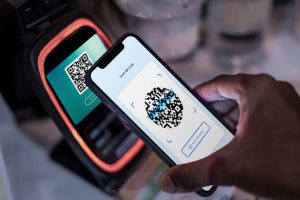Source: Mukuru
Have you ever imagined how transformational a small device in your pocket could be? With the rise of technology, specifically money transfer apps, Africa’s financial landscape is getting a substantial facelift.
According to Euro Monitor, as of 2022, mobile money users in Sub-Saharan Africa surpassed 600 million, with transactions valued at over USD600 billion! There is no doubt that we’re seeing a significant shift in how transactions are carried out.
How Money Transfer Apps are Penetrating the African Market
It’s no secret that the traditional banking system in Africa has struggled to reach the wider population. Limited access to banking facilities, particularly in remote areas, and high transaction costs have been significant barriers. However, money transfer apps are beginning to bridge this gap, offering a lifeline to millions who would otherwise be excluded from the formal banking system.
A new wave of international money transfer apps has emerged, making it possible to send money across borders with just a few taps on a smartphone. This is a huge leap forward, especially for the millions of Africans living in the diaspora, who regularly send money back home to support their families.
Consider the example of a money transfer app such as Mukuru. With its straightforward interface and secure transaction process, it has revolutionized the way people send and receive money across borders. Mukuru isn’t just a money transfer service; it’s a lifeline, helping millions to support their families from afar.
The Mukuru Advantage in the Evolving African Financial Services Ecosystem
Diving deeper into the realm of money transfer apps, Mukuru stands out for several compelling reasons, especially in the African context. While the primary goal of such apps is to facilitate money transfers, Mukuru goes beyond this basic functionality.
One of its major advantages is its vast network of payout points across the continent, making it incredibly convenient for recipients to collect money, even in more remote locations. This widespread accessibility ensures that users aren’t just limited to urban centres but can reach deep into rural areas where traditional banking has often fallen short.
Furthermore, Mukuru places a significant emphasis on customer education and support, which is crucial in regions where digital literacy is still budding. This hands-on approach doesn’t just make transactions easier; it empowers users to take control of their finances with confidence. In essence, while Mukuru streamlines international money transfers, its broader commitment to accessibility, education, and support sets it apart in Africa’s dynamic financial services landscape.
What Came Before?
Before the digital revolution swept across Africa, traditional methods of money transfer held sway. One such system was the hawala, an ancient money transfer system that relied heavily on trust. Originating from Southeast Asia, the hawala system allowed for the transfer of funds without the physical movement of money. In this system, ‘hawaladars’ or money lenders played a pivotal role, accepting cash, charging a modest commission, and then contacting a fellow hawaladar in the destination location to arrange for the funds to be received. For many without access to formal banking, this was their lifeline.
In addition to hawala, other non-digital methods included postal money orders, a service provided by the post office to transfer funds across regions. The sender would pay the amount at one post office, which would issue a receipt. The recipient could then collect the funds at their local post office using this receipt.
Finally, there was the method of physical cash delivery, which was common in local contexts. Here, trusted intermediaries would transport cash from one location to another. Despite the risk of theft or loss, this rudimentary method was often the only choice for many, particularly those in remote areas.
Each of these systems had its own strengths but also faced significant challenges. With the advent of mobile money transfer apps, a new era of secure, affordable, and accessible financial transactions has dawned in Africa.
The Social Impact of Money Transfer Apps
The advent of money transfer apps has been a game changer for small business owners and farmers in Africa. Traditionally, these individuals often found themselves at the mercy of unfavorable loan terms, or even completely excluded from the formal banking sector due to a lack of collateral or well-documented credit history.
Now, thanks to money transfer apps, they can access funds directly and conveniently, right from their mobile phones. This ease of access to finance means they can invest in their businesses, purchase necessary equipment, or acquire additional resources without having to navigate through cumbersome banking procedures.
For farmers, this is particularly transformative. Many farming activities are season-dependent, requiring timely access to funds for purchasing seeds, fertilizers, and other inputs. The ability to transact swiftly and securely through these apps ensures they can procure what they need exactly when needed, improving productivity and income potential.
Furthermore, these apps often come with additional services, such as saving money, paying bills, or even accessing micro-loans. This ease of financial management has led to a more inclusive financial ecosystem, where small business owners and farmers are no longer sidelined but are active participants in Africa’s economic growth story.
Additionally, access to money transfer apps is affecting women in Africa, where these apps have opened up unprecedented opportunities for financial autonomy. In a traditionally patriarchal society, women often face numerous barriers to accessing financial services.
According to the Poverty Action Lab, the rise of mobile money in Sub-Saharan Africa has increased women’s financial inclusion by 22%. By controlling their finances, women are now more empowered to start their own businesses, save for their future, and contribute to their family’s income. This increases the economic stability of households and promotes gender equality and societal change.
The Ripple Effect: Benefits of Money Transfer Apps
The benefits of money transfer apps are far-reaching. They cut out the need for physical travel, saving time and money. They’ve also opened up new opportunities for peer-to-peer lending and microfinance, which are instrumental in driving entrepreneurship and job creation.
By offering lower transaction fees than traditional banks, these apps have made financial services more affordable for the masses. This is particularly beneficial in a continent where every penny counts, and the high cost of financial services has long been a barrier to economic growth.
Where to From Here: The Future of Money Transfer Apps in Africa
As with any innovation, there are challenges to be faced. Regulatory hurdles, cybersecurity concerns, and digital literacy issues are some of the roadblocks. However, the potential benefits outweigh these challenges. With continued investment in technology and digital education, the future looks promising for these apps.
As Africa continues to embrace digital technology, the apps for international money transfer will only become more ingrained in society. We’re on the cusp of a new era, where financial inclusion is not just a distant dream but a tangible reality, thanks to money transfer apps.
The Dawn of a New Financial Era
Money transfer apps are reshaping Africa’s financial landscape from the heart of bustling cities to the remotest corners of the continent. They’re not just changing the way transactions are done; they’re creating opportunities, driving financial inclusion, and fostering economic growth.
It’s safe to say that the age of money transfer apps is upon us, and Africa is at the forefront of this revolution.
The story of these apps is one of hope and resilience, a testament to the power of technology in bridging gaps and making financial services accessible to all.
The small device in your pocket is not just a phone; it’s a powerful tool that’s transforming lives one tap at a time. The future of Africa’s financial landscape is literally at our fingertips, and it’s incredibly exciting to see where it will lead us.






